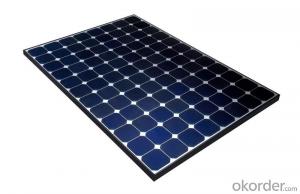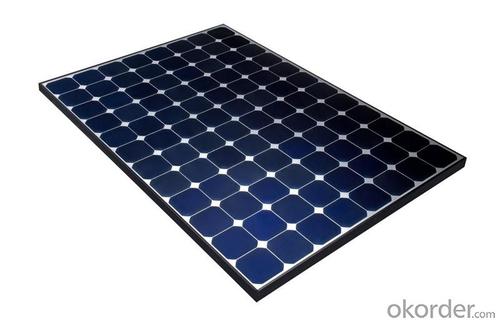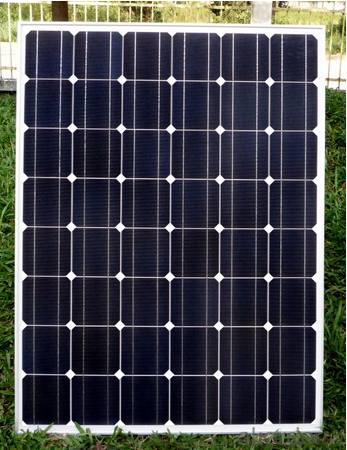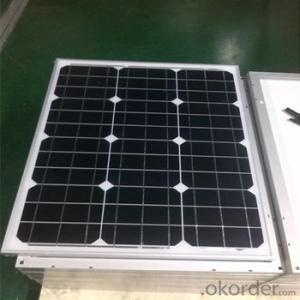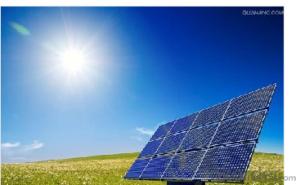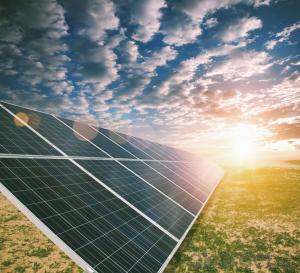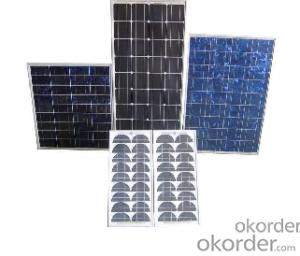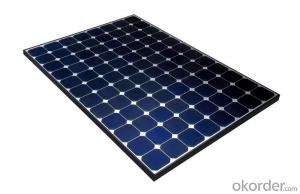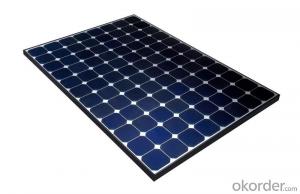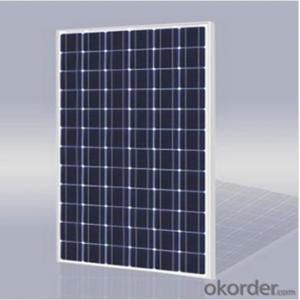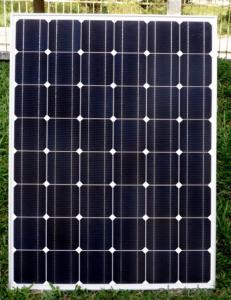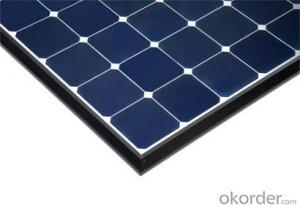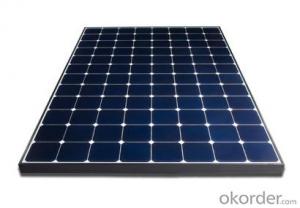CNBM Poly 215W Solar Panels Somerset with TUV UL CE Certificate for Residential
- Loading Port:
- Shanghai
- Payment Terms:
- TT OR LC
- Min Order Qty:
- 100 watt
- Supply Capability:
- 1000 watt/month
OKorder Service Pledge
OKorder Financial Service
You Might Also Like
Specification
CNBM Poly 215W Solar Panel with TUV UL CE Certificate For Residential
Introduction
Each module is rated by its DC output power under standard test conditions, and typically ranges from 100 to 365 watts. The efficiency of a module determines the area of a module given the same rated output – an 8% efficient 230 watt module will have twice the area of a 16% efficient 230 watt module. There are a few solar panels available that are exceeding 19% efficiency. A single solar module can produce only a limited amount of power; most installations contain multiple modules. A photovoltaic system typically includes a panel or an array of solar modules, a solar inverter, and sometimes a battery and/or solar tracker and interconnection wiring.
Micro-inverted solar panels are wired in parallel which produces more output than normal panels which are wired in series with the output of the series determined by the lowest performing panel (this is known as the "Christmas light effect"). Micro-inverters work independently so each panel contributes its maximum possible output given the available sunlight.[6
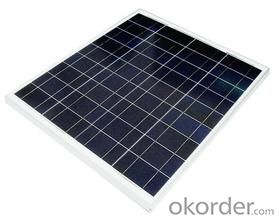
Suggested application
Home lighting business lighting,
Garden lighting, pavement lighting
Farmer household lighting
Decorative water pump
Traffic signal lighting
Industry area
Business area
Solar Power Plant
Product feature
Modules are made of Monocrystalline or Polycrystalline Silicon cell.
Materials and color of the solar panel frame: Clear anodized aluminum alloy type 6063T5 Universal frame; Silver-white color;
The output connection gathers the coupling: Selects conforms to the IEC-612615; 2005, class II, IEC61730 international standard; Airtight waterproofing binding clamp;
Module seal structure: The surface is thick, the high diaphanous rate armored glass with solar cell board special-purpose 3.2mm becomes after the high temperature lamination craft. The back selects has waterproof and anti- aged performance fine TPT materials. The entire block battery board has, the waterproofing, the anti- aging airtight and so on the fine performance;
Power tolerance: +/-3%
Packaging
International standard cartons (according to the requirements of customers)
- Q: Can solar panels be installed on a house with a flat roof?
- Yes, solar panels can be installed on a house with a flat roof.
- Q: I've found something called maximum system voltage 000v on my 0 w panel nameplate. Its impossible for 0w to have 000v, right?
- Build okorder /
- Q: How much electricity can a solar panel produce?
- The amount of electricity a solar panel can produce depends on several factors, such as its size, efficiency, and the amount of sunlight it receives. On average, a standard solar panel can generate anywhere from 250 to 400 watts of electricity per hour. However, larger and more efficient panels, combined with optimal sunlight conditions, can potentially produce even more electricity.
- Q: okay so im lookin 4 an article which explains how practical, wokable, feasible solar panels are. only positive points please :) give me the link. PLZ HELP!!!!
- photograph voltaic panels are as powerful by means of fact the area helps. working example, I checked into photograph voltaic panels for my domicile in northern Indiana and found out that they are very ineffective right here by means of fact we've cloud conceal over 60% of the twelve months. regardless of the some temperture base if we've been in simple terms on the different fringe of Lake Michigan the comparable panels could be greater powerful. My analyze has shown that wind power is lots greater powerful. we attempt to get a zoning variance so as that we can deploy a windmill. in view that your venture is for eco-friendly, undergo in concepts that each and all of the timber used would desire to be bamboo, as that's the main sustainable timber source.
- Q: im interested in starting a solar panel manufacturing company. ive researched on how to make them and it doesnt look too hard, and is definitely something i can figure out. i would be starting from nothing so my question is what are the chances of me actually selling a lot of panels and the business actually succeding?thanks
- No okorder 3) Figure out how much labor and material cost would go into each panel. Would you locate in the US? It's hard to beat the big players in China, in this commodity market. It would be like having a small company to make laptops, and trying to beat HP, Dell,and Lenovo.
- Q: Hi, I bought 50 6X6 inch solar cells, I also bought a 40 amp diode, I still need to buy a battery, and inverter and a voltage controller, could you tell answer me the following questions:) I would like t build a small panel at first, (may be 0 X 0 inch), with that I would like (or at least to try) to power my laptop for the hole day, so I wont receive a very high amperage, yet, all the inverters I saw at e-bay are rated over 400 amp, if I buy a 400 amp inverter, can I use it with such a small amperage?2) what about buying a small car inverter, will it work?3) suggestion about the battery and the voltage controller will be kindly appreciated.Thanks
- I have an inverter that I use in my vehicle. It is rated for 400 amps this is it's maximum capacity. I can use it for less. It converts 2V DC to 20V AC. So Thais is all I need and may be your cheapest option. If your panels are producing a lot of amperage you may need a regulator to stop charging when your battery is fully charged.
- Q: Can solar panels be installed on any type of roof?
- Solar panels can be installed on almost any type of roof, including asphalt shingle, metal, tile, and flat roofs. However, the feasibility and ease of installation may vary depending on the roof's condition, angle, and orientation towards the sun.
- Q: Can solar panels be installed on a residential community?
- Yes, solar panels can be installed on a residential community. Many residential communities are adopting solar energy as a sustainable and cost-effective alternative to traditional electricity sources. Installing solar panels in residential communities can help reduce energy costs, decrease reliance on fossil fuels, and contribute to a cleaner and more sustainable environment.
- Q: Can solar panels be installed on a museum or cultural institution?
- Yes, solar panels can be installed on a museum or cultural institution. Installing solar panels can help these institutions reduce their energy costs and carbon footprint, while also showcasing their commitment to sustainability and environmental stewardship. Additionally, solar panels can be installed on rooftops or in nearby open spaces, minimizing any aesthetic impact on the museum's architecture or surrounding areas.
- Q: Does anyone know the earnings potential for the actual fitter of pv solar panels,and the electricians earnings.ty.
- it depends on your solar panel, but you can sure supply most if all of your electronics and electric stuff in your house on a sunny day. If you want to know exactly how much power it supplies and how much $$ you can save you simply have to calculate how much power your home consumes per day/month. I know of people totally reliable on solar power for their home and I too will put solar panels on my home one day.
Send your message to us
CNBM Poly 215W Solar Panels Somerset with TUV UL CE Certificate for Residential
- Loading Port:
- Shanghai
- Payment Terms:
- TT OR LC
- Min Order Qty:
- 100 watt
- Supply Capability:
- 1000 watt/month
OKorder Service Pledge
OKorder Financial Service
Similar products
Hot products
Hot Searches
Related keywords
